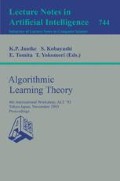Abstract
The main contribution of this paper is the development of analytical tools which permit the determination of team learning capabilities as well as the corresponding types of redundancy for Popperian FINite learning. The basis of our analytical framework is a reduction technique used previously by us.
Using our analytical tools we determine the redundancy types for all ratios of the form 4n/9n−2, where n≥2, which defines the sequence of capabilities for probabilistic PFIN-type learners in the interval (4/9,1/2]. We also show that there is unbounded redundancy at the ratio 2/5, i.e., quadrupling the team size and keeping the success ratio will always increase learning power. We also extend, using our tools, the region of known PFIN-type learning capabilities, by presenting an ω2 sequence of learning capabilities beginning at 1/2 which converges to 2/5. We believe that this sequence forms the backbone of the learning capabilities in this interval, but that the actual capability structure is very much more complex.
Preview
Unable to display preview. Download preview PDF.
References
J. Case, and C. Smith, Comparison of identification criteria for machine inductive inference, Theoretical Computer Science, 25, 193–220.
R. Daley, and B. Kalyanasundaram, Capabilities of Probabilistic Learners with Bounded Mind Changes, In Proceedings of the 1993 Workshop on Computational Learning Theory, 1993.
R. Daley, B. Kalyanasundaram, and M. Velauthapillai, Breaking the probability 1/2 barrier in FIN-type learning, In Proceedings of the 1992 Workshop on Computational Learning Theory, 1992.
R. Daley, B. Kalyanasundaram, and M. Velauthapillai, The Power of Probabilism in Popperian FINite Learning, In Proceedings of the 1992 Workshop on Analogical and Inductive Inference, Lecture Notes in Computer Science 642, 151–169.
R. Daley, L. Pitt, M. Velauthapillai, and T. Will, Relations between probabilistic and team one-shot learners, In Proceedings of the 1991 Workshop on Computational Learning Theory, pages 228–239, 1991.
R.V. Freivalds, Finite Identification of General Recursive Functions by Probabilistic Strategies, Akademie Verlag, Berlin, 1979.
S. Jain, and A. Sharma, Finite learning by a team, In Proceedings of the 1990 Workshop on Computational Learning Theory, pages 163–177, 1990.
M. Velauthapillai, Inductive inference with a bounded number of mind changes, In Proceedings of the 1989 Workshop on Computational Learning Theory, pages 200–213, 1989.
Author information
Authors and Affiliations
Editor information
Rights and permissions
Copyright information
© 1993 Springer-Verlag Berlin Heidelberg
About this paper
Cite this paper
Daley, R., Kalyanasundaram, B. (1993). Use of reduction arguments in determining Popperian FIN-type learning capabilities. In: Jantke, K.P., Kobayashi, S., Tomita, E., Yokomori, T. (eds) Algorithmic Learning Theory. ALT 1993. Lecture Notes in Computer Science, vol 744. Springer, Berlin, Heidelberg. https://doi.org/10.1007/3-540-57370-4_46
Download citation
DOI: https://doi.org/10.1007/3-540-57370-4_46
Published:
Publisher Name: Springer, Berlin, Heidelberg
Print ISBN: 978-3-540-57370-8
Online ISBN: 978-3-540-48096-9
eBook Packages: Springer Book Archive

